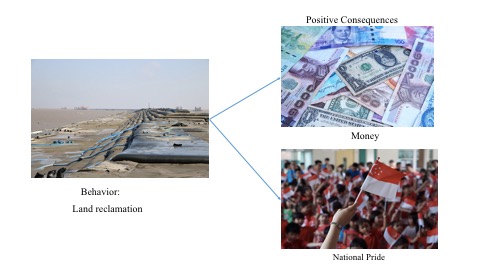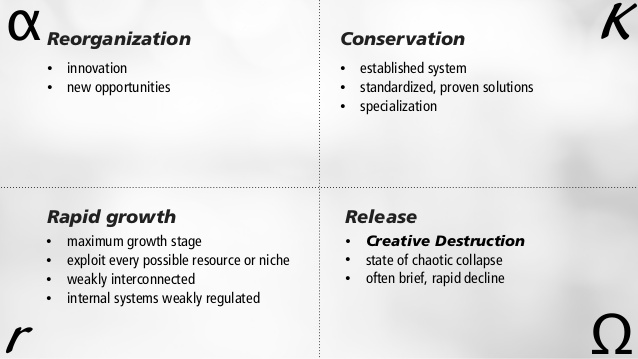Importing Countries’ Perspective
Below are some questions to guide your thoughts on the psychological perspective of importing nations.
Although there are reports in these countries, documenting the effects of sand exploitation/mining (such as reduced biodiversity of fishes and its population, landslides and collapse of riverbanks), illegal or legal sand mining still persist. Why? Despite being the top importer of sand, Singapore is not the largest consumer of sand in the world. Singapore understands that if we do not import the sand for land reclamation and further developing our physical infrastructure by building building, plants, public amenities, we may lose our competitive edge in this quick and technology disrupting era.
The then Singapore Government, back in the 1980s, had plans to rejuvenate the city in preparation for the 21st century, to integrate the concept of Work, Live and Play. Today, we see the outcomes of these works, namely, the Marina Bay Financial Centre, Gardens by the Bay, Marina Bay Sands, Art Science Museum, the Sail@Marina. Just in the first year of Marina Bay Sand's operations, it generated S$631 million in revenue and a pre-tax profit of S$315 million. Tourist arrivals also has increased more than twice in the past decades, providing employment for about 164,000 people (Tan, 2017).

Land Reclamation Works carried out near Victoria Harbour, Hong Kong SAR
Cr: City Hall Views Victoria Harbour Land Reclamation Construction Site n Central Public Pier 9 n Kln (ChvhLR10, 2008)
Singapore had and still has to stay competitive in the world. Major financial hubs, such as Hong Kong SAR are still expanding their cities and airports. Even our closest neighbour, Malaysia has embarked on land reclamation works for the Forest City project estimated to have a value of $58billion, spanning across 1, 386ha (13.86 sq km). Forest City aims to bring external investments, increase local employment, spur the local economy by building offices, residential towers, shopping centres, parks and international schools for 700,000 people. If our neighbours and competitors are doing this, why should Singapore sacrifice her benefits to "save" the Earth and realize that have her benefits are taken by others and the problem of environmental degradation still persisting?
Singapore has always been touted as a Garden City and now a City in a Garden. Since the early days of independence, Singapore's Prime Minister, Mr Lee Kuan Yew, started his Garden City Vision. He planted trees every year and under his leadership many initiative were launched such as Singapore Green Plan and Clean and Green Week. Based on the evidence above, we can see that Singapore is and always wanting to be as environmentally friendly as possible.

Singapore's Garden City
Cr: Pinterest.com
However, there is also a competing cognition that we need to grow our economy, grow our population to ensure the survival of Singapore. How do we reconcile this conflict? We attempt to put more significance to our economic benefits and rationalize our thoughts. For example, according to a Channel Newsasia article, the profits generated was adequate to cover the cost "“If you add up the historical EBITDA numbers from 2010 to 2015 – at more than S$1 billion a year – both entities would have covered (the initial investment cost),” said Ms Chen. Including land cost, the initial investment cost came up to about S$7.7 billion for MBS, and S$6.6 billion for RWS.".
Moreover, during a work trip to Vietnam, Singapore's Minister for Environment and Water Resources was thanked by Vietnam's President for sharing its experience in environmental protection. Singapore is able to able to resolve the dissonance by adding behaviours of providing knowledge and expertise to these developing countries and also shifting emphasis on cost-benefit balance of sand.
Therefore, the government and the companies running it would feel justified to for mining the sand for greater good for its own people but at the same time paying its exporting countries at a fair and market price and share knowledge to compensate for its "externalities".
Operant conditioning posits that people's behaviour is modified based on the pleasantness or aversiveness of the stimuli. People change their behaviour based on the consequence of their behavior.
In Singapore, land scarcity has restrained our countries in many areas in the physical development of the nation. We can build taller building, but really how tall can we build? The most feasible way is to reclaim land from the coastal areas of Singapore. When the Marina Bay Financial Centre was completed, the Chief Executive Officer of the Manager of MBFC said, "MBFC is the realisation of the Singapore government's work-live-play concept for Marina Bay, offering a quality work environment, the best in waterfront living and a variety of dining and shopping options. MBFC has set a new regional standard for integrated mixed-use developments, on par with that of renowned financial centres around the world." His speech inferred that the completion of MBFC has made a new symbol an national pride for Singapore.
Research from the Lee Kuan School of Public Policy also suggested that such idea of developing a global city from land reclamation has appealed and supported by the state as early as in the 1970s. Singaporeans and the Government have supported the nation to continuously engaged in land reclamation because we are rewarded positively through economic prosperity and national pride with land reclamation (the behaviour). The secondary reinforcers of economic prosperity and national pride is then produces improved material wealth, increased sense of self-esteem, national identity and more overall happiness. In essence, better happiness and improved economic outlook is reinforces land reclamation behaviours because this will increase the likelihood that land reclamation will be more likely to be carried out in the future.
Singapore is fortunate not to be located on a fault line of a tectonic plate. There is almost no report of natural disaster in Singapore. Singapore, having to purchase her sand from her neighbours, does not really feel the impact of the environmental destruction occurring. Although marine life in the coastal areas may be affected, destruction of marine coast has not led to anything serious or lost of severe economic benefits. Since the threats that Singapore perceived low in both in our country and our neighbouring exporting country, we underestimate the risk that sand exploitation and land reclamation brings.
To elaborate on this issue, Singapore and their neighbours may also adopt the belief of "human mastery and control" in the environment. Their thoughts may reside in paradigm that endorses, "exploit first, conserve later", having a very linear and simplistic view that nature is able to heal and recover on its own. This idea may be based upon the stages of complex evolving systems: Exploitation, Conservation, Release and Reorganisation. The diagram below shows the process of complex evolving system.
However, the world is not as simplistic as what we thought. Philosopher Gordon brought up the idea that there is chaos happening in all sorts of social system and in some systems, changes are orderly whilst in other changes are erratic.
This randomness happening in a controlled or deterministic system is known as chaos theory. This supports the "butterfly effect" which is defined as a small change that can lead to drastically large effect. Taken together, the two ideas highlights that humans are actually unable to predict the consequences of the environmental impact. Therefore, the lack of understanding of the unknown through the Chaos Theory could lead us to the continuation of resource exploitation.
The national media and culture indirectly supports materialism and consumption. In Singapore, despite being a developed nation, people in Singapore perceive a person's worth to the material wealth that one possess and the status of the education institution that one attended previously. Although such values are slowly shifting towards compassion, the locals continue to perceive Singapore as a materialistic society (Lim, 2015). Linking this situation to Sadalla and Krull (1995), being actively involved in environmental issues in a "materialistic values" society may be perceived negatively, explaining why the general society does not tend to have a strong environmental identity.



